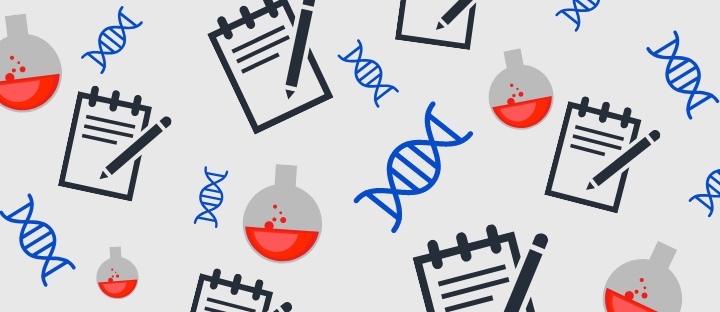#ScienceSaturday posts share exciting scientific developments and educational resources with the KAND community. Each week, Dr. Dylan Verden of KIF1A.ORG summarizes newly published KIF1A-related research and highlights progress in rare disease research and therapeutic development.
KIF1A-Related Research
Clinical and Genetic Characterization of a Cohort of Brazilian Patients With Congenital Ataxia
KAND is a rare disorder, but each new patient makes it slightly less so. One reason we think the prevalence of KAND is underestimated is the number of other disorders where genetic testing has revealed KIF1A mutations. We’ve discussed this in the context of cerebral palsy, hypoxic ischemic encephalopathy, and other disorders. In this week’s article, researchers in Brazil identified a KIF1A mutation in a cohort of patients with congenital ataxia.
Congenital Ataxia describes a condition of motor developmental delay and reduced muscle tone. The term was established in 1893, over 20 years before the word genetics was coined. You can review our other discussion of genetic testing in Brazilian patients with ataxia from a few weeks ago.
In this study, researchers performed Whole Exome Sequencing on 30 patients with congenital ataxia. 17/30 patients had motor symptoms without other complications, while 13 had other symptoms like epilepsy or vision loss. Researchers identified one patient with an R254Q KIF1A mutation, the most common known KAND variant in our registry. This patient had issues with gait and reduced cerebellar volume.
And once again, KIF1A wasn’t alone in this cohort; the researchers identified 18 genes, including ones that often show up alongside KIF1A in other genetic studies, like the tubulin gene TUBB4A. This highlights that genes that interact in neurons are more likely to cause overlapping symptoms. By talking to groups with these mutations, we may identify other diseases whose patients have KIF1A variants.
Rare Roundup
A huge thank you to Professor Yamasaki’s Master’s Students from Columbia University
Undergraduate and graduate students are the bedrock of many projects, and this year we’ve been fortunate to have 6 Master’s students in Professor Lili Yamasaki’s Seminar in Biotechnology Course volunteer with KIF1A.ORG. Over the last semester they learned about patient-centered research and helped us build future resources, including summaries of KAND’s overlap with other disorders, and variant-by-variant summaries for patients and researchers.
This has been a long and fruitful collaboration, with KIF1A.ORG hosting students in 2021 and 2022; one alumni includes our very own board member Michelle Tao! We’re grateful to Dr. Yamasaki for creating this opportunity, and to Wangyang, Jamie, Ada, Haiqi, Wenxu, and Xiangyi for all the work they’ve put in this semester.
Wangyang Dai
Wangyang is a master student in the M.A. Biotechnology program at Columbia University. She obtained her Bachelor’s degree in Life Sciences from Fudan University in 2023. During her time as an undergraduate student, she conducted research on proline metabolism and its effects on ATF4 regulation. Later, she developed an interest in the RNA world, specifically focusing on alternative splicing and its correlation with neuron cell properties within and across cell types. Now in the Zhang lab, she is involved in a project about analysis of CLIP data using crosslink-induced mutation sites (CIMS) and aims to utilize it as a signature to better understand RBP binding specificity.
Jamie Woych
Jamie received her BS in Biochemistry from SUNY New Paltz in 2018. She previously worked in the Cellular Biology Department at Rutgers University as a research associate, working with zebrafish as models for neural development. She bridges her interests in biology and neuroscience through her work in the Tosches Lab, in the Biological Sciences Department at Columbia University, where she has been the lab manager for the past four years. In the lab, she is currently studying the evolutionary conservation of cell types and circuits involved in the amphibian olfactory system.
Ada Lyu
Ada Lyu is a graduate student completing her master degree at Columbia University. She graduated from UC San Diego with a B.S. degree in human biology in 2023. Her undergraduate research focused on lipid metabolism of NASH at UCSD Medical School and DNA breakage and repair mechanism at Scripps Research. Lyu is currently working in a lab at Columbia University Irving Medical Center studying the influence of cholesterol on cardiovascular health.
Xiangyi Liu
Xiangyi Liu is currently a student in the M.A. Biotechnology program at Columbia University. Having graduated from the B.S. program in Molecular and Cellular Biology at Wenzhou-Kean University, Liu’s previous research focused on the characterization of novel probiotics and the anti-tumor effects of pangolin scale extract on human cervical cancer. She also once interned at Wenzhou Institute, University of Chinese Academy of Sciences and participated in the research of photocurable protein-based hydrogels for developing an in vitro liver model for hepatitis drug screening.
Haiqi Chen
Haiqi Chen is a graduate student from the Department of Biological Science at Columbia University. She once worked at SACELLS Biotechnology Co. Ltd and was engaged in research related to the extraction and culture of stem cells and immune cells. During her undergraduate studies, she worked on heart disease research in Chi Kueng Lam’s laboratory at the University of Delaware. Examine the effects of modulating target proteins or genes in cardiac physiology and pathophysiology using mouse models and human induced pluripotent stem cell (iPSC) platforms.
Wenxu Ge
Wenxu Ge is a master student in Biotechnology at Columbia University (start a Ph.D. program in Chemistry in the fall of 2024). Holding a BA in Chemistry and Biochemistry from Boston University, Ge’s research is focused on the development of nanoparticles and innovative drug delivery system. In undergraduate research at Reinhard Lab, he researched HIV nanomedicine and influence of nanoplastic on GI-tract (which was published on ACS Nano). Currently, Wenxu is part of Cornish Lab at Columbia University, working on theranostic cells and synthetic biology of yeast vaccine.

